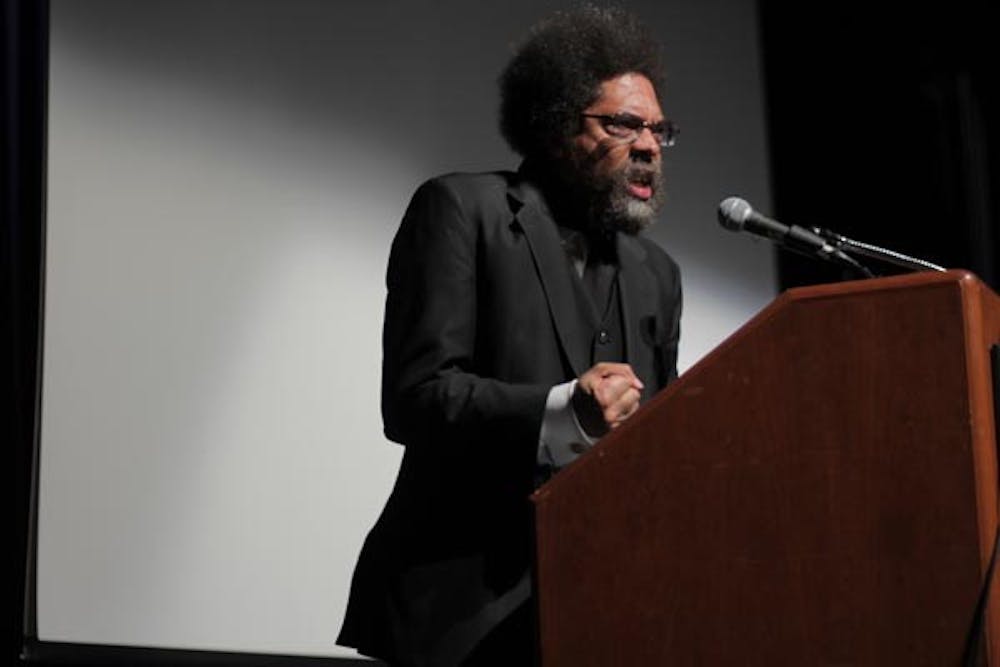During a panel discussion held at a Phoenix high school Saturday afternoon, Princeton philosophy professor and activist Cornel West said the formation of Arizona’s new immigration law was driven by white supremacy.
West expressed his views on SB 1070 and other Arizona immigration laws to a crowd of about 900 at North High School.
He was part of a panel that included ASU professors, a UA professor and activists that explained the roots and effects of SB 1070.
The panel was organized and hosted by Puente, a local organization that fights for immigrant rights, and National Day Laborer Organizing Network, an activist group.
West said SB 1070 has brought stigma and terror to the community because of racism.
“The history of white supremacy in America keep[s] these people so terrorized … traumatized, stigmatized that they will want to walk around with their backs hunched over,” he said, referring to the immigrant community.
He also said that “brown” people have a lot to learn from “black folk,” because they have also dealt with trauma referring to black slaves and the civil rights movement of the 1960s.
“Arizona is ground zero for the struggle for rights and liberty,” West said after he was received with a standing ovation and clamorous cheers from a culturally diverse crowd.
Sandra Castro, an ASU history senior who works for Puente, said West was invited to speak about SB 1070 and other anti-illegal immigrant laws and how they “are strategically done by law officials” to negatively affect the immigrant community.
The groups were hoping to reach a diverse crowd and not just Hispanics, she said.
Pablo Alvarado, executive director of National Day Laborer Organizing Network who was also a panelist, said Arizona’s immigration laws are a strategy to “close every opportunity for immigrants to survive.”
He referred to laws like Proposition 200, which denies public services to undocumented residents; section 287(g) of the Immigration and Nationality Act, a federal immigration enforcement program that allows local law enforcement to ask for immigration status; and the Employer Sanction Law, which punishes employers with fines if they knowingly hire undocumented workers.
Their purpose is to “make life miserable for migrant workers [so they] can pack their bags and leave,” Alvarado said.
During the ceremonial signing of a bill on the West campus on Sept. 15, Gov. Jan Brewer said SB 1070 wasn’t intended to terrorize the Hispanic community, but to cut down on illegal immigration.
“We can’t deal with the illegal immigration here in Arizona,” she said.
The panel also touched on House Bill 2281, the ban of ethnic studies, which targeted schools in Tucson that teach Chicano studies and was signed into law by Brewer last May.
Raquel Rubio Goldsmith, a UA Mexican-American women’s history professor, said Tucson schools have struggled to get a Chicano studies program at Tucson high schools and feels that banning the program is unjust.
The Los Angeles Times reported that Tom Horne, the state superintendent of public instruction, said the program “divides students by race and promotes resentment.”
Matthew Whitaker, an ASU history professor, brought up Proposition 107, also known as the “affirmative action proposition,” which would ban discrimination or preferential treatment in government work places.
“It’s an attack on access on inclusion,” he said.
Other panelists included Tupac Enrique Acosta, founding member of Tonatierra, an Indigenous community-based organization in Phoenix that is involved in a lawsuit against SB 1070; and Michelle Tellez, an ASU assistant professor researching women border crossers.
Chris Newman, an organizer of the event and a lawyer for National Day Laborer Organizing Network, said West has wanted to come to Arizona and finally worked out a schedule to get him here.
You can listen to Cornel West's speech at http://www.nahuacalli.org/Media.html
Reach the reporter at uriel.garcia@asu.edu





